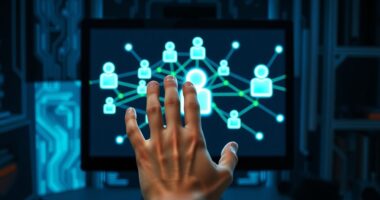An algo, short for algorithm, is a clear set of steps you use to solve problems or complete tasks. It starts with an input, like data or numbers, and processes that information through logical operations. You can think of it as a recipe that guides you through cooking a dish, where each step must be followed for success. Algorithms are crucial in computer science and everyday activities, impacting everything from search engines to music recommendations. If you're curious about how they impact our lives and the technology around us, you'll discover even more fascinating details ahead.
Key Takeaways
- An algorithm is a structured method for problem-solving in computer science, starting with an input and producing an output.
- It consists of clear, unambiguous instructions involving computations, logical steps, and decision-making elements.
- Key properties of algorithms include finiteness, definiteness, effectiveness, determinism, and feasibility to ensure reliable outcomes.
- Algorithms are widely used in various applications, such as sorting, recommendations, and navigation systems.
- Understanding algorithms is important for enhancing efficiency and making informed decisions in technology and daily life.
Algorithm Fundamentals Explained

Algorithms are the backbone of problem-solving in computer science, guiding how data is processed and decisions are made. They start with an input, which can be anything from numbers to complex data structures. Next, the processing phase involves computations that transform this input based on logical steps. You'll often find decision-making elements, using conditional statements to steer the algorithm's flow. Looping allows for repetition of certain steps until a condition is satisfied, ensuring efficiency. Finally, every algorithm must have a termination point to prevent infinite loops. Key properties include finiteness, definiteness, effectiveness, determinism, and feasibility, ensuring that algorithms are precise, practical, and reliable in delivering consistent results for given inputs. Additionally, the importance of algorithms in machine learning is evident, as they enable machines to learn from data, making predictions and decisions.
Defining Algorithms in Context

While you may think of algorithms as mere mathematical constructs, they play a vital role in everyday technology and decision-making processes. An algorithm is essentially a set of clear, unambiguous instructions designed to solve problems or perform calculations. These finite rules ensure that you can achieve an output after a specific number of steps, whether through manual execution or automatic processing. You'll find algorithms everywhere—from sorting numbers and recommending content on social media to powering navigation systems and music streaming services. They are essential in computer science for programming and solving complex problems. They come in various types, including brute force, recursive, and sorting algorithms, each tailored to specific tasks. Understanding algorithms helps you appreciate their importance in computer science, mathematics, and our daily lives.
Processing Data Efficiently

Understanding how algorithms work leads to a greater appreciation for the need to process data efficiently. Caching, for instance, helps you store frequently accessed data, reducing the need for costly data scans. Indexing allows for quick searches without scanning the entire dataset, significantly speeding up the extraction process. Data compression minimizes the information to scan, preserving content while improving processing time. Lazy evaluation delays calculations until absolutely necessary, optimizing performance by avoiding unnecessary operations. Heuristics empower you to make quick decisions, approximating solutions to reduce scans. Moreover, employing efficient algorithms significantly enhances the overall performance of data handling tasks.
Pros and Cons of Algorithms

When you consider the role of algorithms in today's world, it's easy to see their significant impact on decision-making and efficiency across various sectors. They provide rational decision-making, reducing biases and improving accuracy in predictions.
Personalized recommendations enhance your online experiences, making social connections simpler. In finance and healthcare, algorithms increase access to services and optimize resource allocation. Furthermore, these data-driven insights can lead to improved individual health management, potentially easing healthcare system burdens.
However, they come with drawbacks. Bias in training data can lead to unfair outcomes, while privacy concerns arise from personal data collection.
Their complexity might create reliance on technology, potentially diminishing your skills. Lastly, ethical implications challenge accountability and responsibility.
Balancing these pros and cons is crucial as you navigate an increasingly algorithm-driven world.
Algorithm vs. Traditional Methods

As algorithms continue to evolve, distinguishing between machine learning and traditional methods becomes essential for effective decision-making.
Machine learning thrives on dynamic, unstructured data, adapting quickly to new patterns and scenarios. In contrast, traditional methods rely on structured data and predefined rules, making them rigid and less flexible. Additionally, machine learning excels in processing complex and dynamic datasets, which enhances its adaptability to various tasks.
While machine learning can handle complex tasks like image generation or fraud detection, traditional algorithms are best for straightforward, repeatable tasks such as payroll.
Machine learning enhances decision-making by processing vast datasets and learning continuously, whereas traditional methods follow a predictable, linear approach.
Algorithmic Bias and Fairness

Algorithmic bias can significantly impact decision-making processes, leading to unfair outcomes that affect individuals and communities. This bias often stems from skewed data, reflecting the prejudices of those who collected it.
For instance, biased algorithms in hiring may favor one gender, while facial recognition systems struggle with darker skin tones due to lack of diverse training data. Human choices in data categorization can further entrench these biases, as can the design of the algorithms themselves. Historical data reflecting societal biases can skew results and exacerbate these issues.
To combat this, you can advocate for diverse datasets, regular audits, and transparency in AI processes. By emphasizing fairness, you help ensure that algorithms serve everyone equitably, rather than perpetuating existing disparities in areas like healthcare, credit, and resource allocation.
AI-Driven Algorithm Innovations

AI-driven algorithm innovations are reshaping various industries by enhancing the capabilities of machine learning, quantum computing, and big data analytics.
You'll find deep learning techniques improving tasks like computer vision and natural language processing, while AutoML makes deploying complex models accessible to businesses lacking technical expertise. As a result, this growth in AI has the potential to add $15.7 trillion to the global economy by 2030.
New algorithms efficiently process large datasets and real-time inputs, especially in Edge AI for IoT applications.
Quantum computing, leveraging qubits, performs complex operations exponentially faster and with less energy, revolutionizing AI capabilities.
As data volume grows, big data analytics extracts valuable insights, driving automation and personalization.
These advancements in algorithm efficiency lead to significant performance boosts, allowing you to harness AI's full potential for innovative solutions.
Optimize for Data Integrity

Innovations in AI have made data handling more sophisticated, but they also highlight the importance of maintaining data integrity.
To optimize for data integrity, start by implementing data validation checks during entry to ensure it meets predefined rules. Use range and consistency checks to confirm data falls within acceptable parameters. Cross-reference data with reliable sources for accuracy, and employ checksums to detect alterations. Regular audits of data accuracy are essential for maintaining data integrity standards.
Access control is crucial—restrict data access to authorized personnel and regularly update permissions. Protect sensitive information with encryption and conduct regular audits to ensure compliance with security standards.
Lastly, establish reliable backup systems and maintain comprehensive audit trails to track changes and assess the overall health of your data assets.
Frequently Asked Questions
How Do Algorithms Impact Everyday Decision-Making?
Algorithms impact your everyday decision-making by streamlining choices and managing information overload. They help you filter search results, optimize your routes, and suggest content like movies and music based on your preferences.
While they can save time and provide tailored recommendations, they also shape your experience by creating filter bubbles, limiting exposure to diverse information. This can influence your choices and lead to biases, making it essential to stay aware of their effects.
Can Algorithms Be Biased or Unfair?
When you've got a hammer, everything looks like a nail. Yes, algorithms can be biased or unfair. They learn from data, and if that data reflects existing prejudices, you'll see skewed results.
Limited training data can also lead to unfair decisions. Additionally, human-designed criteria can introduce bias, making it crucial for you to ensure diverse and representative training datasets.
Otherwise, you risk perpetuating historical biases in your decision-making processes.
What Industries Rely Heavily on Algorithms?
Many industries rely heavily on algorithms to boost efficiency and drive decisions.
In logistics, companies like UPS optimize routes to save time and costs.
E-commerce giants like Amazon use algorithms for personalized shopping experiences.
Technology firms leverage machine learning for content moderation and ad targeting.
Healthcare and finance sectors utilize data analysis to improve patient care and manage risks.
Are There Ethical Concerns Surrounding Algorithm Use?
Imagine navigating a maze where the walls shift unexpectedly—that's what ethical concerns around algorithm use can feel like.
You mightn't realize that algorithms can inherit biases from their training data, leading to unfair outcomes in hiring or lending.
Privacy issues also arise when sensitive data is mishandled.
Plus, the complexity of these systems can obscure accountability, making it tough for you to trust the decisions they make.
It's crucial to address these challenges.
How Can I Learn to Create My Own Algorithms?
To create your own algorithms, start by identifying a specific problem you want to solve. Break it down into smaller parts and plan your approach on paper first.
Use pseudocode or flowcharts to outline your steps. Once you've drafted your plan, implement it in a programming language like Python.
Test it with different inputs, refine it for efficiency, and document your process to help you understand and improve your algorithm over time.
Conclusion
So, next time you hear the word "algorithm," don't panic! It's just a fancy way of saying, "I'm too lazy to think for myself." Sure, algorithms can be helpful, but they can also lead to chaos—like giving your GPS the authority to decide your lunch spot. Remember, while algorithms may crunch numbers faster than you can say "data integrity," they're still not a substitute for good old human judgment. So, keep your wits about you!









